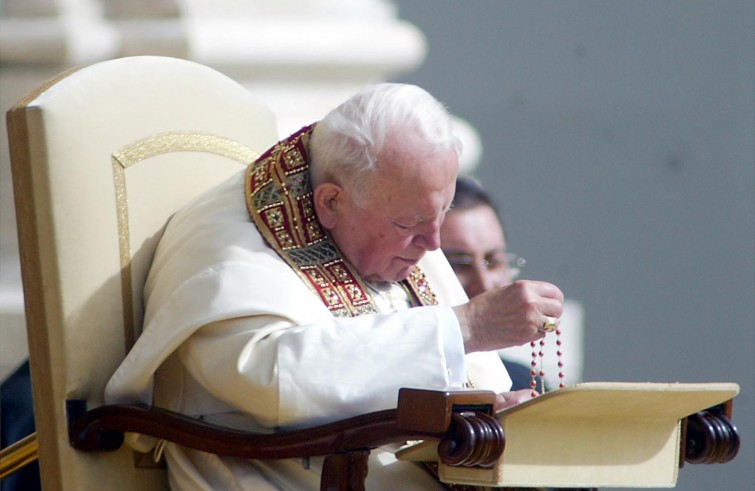
“The life of John Paul II was one of unceasing obedience to the Gospel of Jesus.” These were the opening words of the homily given in St Peter’s Basilica by Cardinal Angelo Comastri, Vicar General Emeritus of His Holiness for Vatican City, on the occasion of the 10th anniversary of the canonisation of John XXIII and John Paul II. The solemn liturgy was attended by a large number of faithful. It was presided over by the Dean of the College of Cardinals, Cardinal Giovanni Battista Re. Cardinal Stanislaw Dziwisz, former personal secretary to the Polish Pope and Archbishop Emeritus of Krakow, was among the many concelebrants.
Cardinal Comastri recalled the unwavering defence of human life that John Paul II offered and his emphasis on the right to life as a cornerstone of all “human coexistence”. He also highlighted Wojtyla’s courageous commitment to world peace, whose legacy is carried forward today by Pope Francis. Comastri recalled John Paul II’s special relationship with young people. “The Polish pontiff,” he said, “reached out to young people, and young people saw him as their friend: a true friend, a sincere friend, a friend who never made concessions to win hearts and minds, a friend who did not water down the evangelical proposal for the sake of popularity, a friend who never resorted to demagoguery to garner young people’s support.”
It is precisely for these reasons, Comastri continued, that “the young people loved John Paul II so much and turned to him as one would turn to a father who, if necessary, also knows how to put right, for he knows how to love truly and sincerely”.
At the end of his homily, Cardinal Comastri, speaking extemporaneously, described a meeting between John Paul II and Ali Agca, the man who attempted to assassinate him in St Peter’s Square in 1981. The latter paid a visit to the Chapel of St Sebastian in St Peter’s Basilica, where the Pope’s mortal remains were laid to rest on 27 December 2014. Without revealing the as-yet unknown content of the conversation between the Pope and his assailant, Comastri recounted that Agca placed a bouquet of flowers on his tomb, and pointed out that the Pope had visited him in Rome’s Rebibbia prison on that very day in 1983. “We thank God for the fruits of faith, hope and charity that the holiness of John Paul II has brought and continues to bring to the Church,” said Card. Stanislaw Dziwisz, who expressed his thankfulness for the celebration in the Vatican Basilica. Speaking “on behalf of all those who love and have loved John Paul II”, the prelate offered his gratitude both to Benedict XVI, who opened the way for the Polish pontiff’s beatification, and to Pope Francis, who “proclaimed him a saint ten years ago today.” After the solemn liturgy, the Cardinal, accompanied by numerous faithful, went to John Paul II’s tomb to pray and pay homage to the Saint with a bouquet of white roses.
In Poland, the anniversary of Karol Wojtyła’s canonisation was commemorated with due solemnity. At the shrine dedicated to John Paul II in Krakow, Archbishop Marek Jędraszewski observed that “the Church, by listing the Pontiff among the ranks of the saints, has instructed us to pray for his intercession for the salvation of the world, for peace, and for hope.” On the eve of his canonisation, numerous shrines throughout Poland hosted prayer vigils and moments of communal reflection. In fact, John Paul II is remembered and worshipped in Poland with special significance. Recent reports indicate that relics of the Pontiff are venerated in more than 100 churches and chapels throughout the country. Moreover, in almost two decades since the Polish Pope’s demise, a multitude of communities have been founded in his honour, each of which engages in a range of charitable activities in accordance with his teachings.
Furthermore, over 700 streets, approximately 250 public squares and more than 50 public parks in numerous cities and towns throughout Poland have been named after the Polish Pope. It would be impossible to provide a comprehensive list of the numerous monuments dedicated to Karol Wojtyła nationwide. However, the latest data indicate that over 800 sculptures of the Polish Pope can be found in public spaces.
Finally, several shrines, approximately 40 parishes, as well as several foundations and institutes, including the Opera del Tertio Millennio Foundation, the eponymous Institute, the Centre for the Thought of John Paul II and the Institute for Intercultural Dialogue, have been dedicated to John Paul II. Additionally, some universities bear the name of Karol Wojtyła, commemorating him as a scholar in his own right. Of these institutions, the most renowned is the Catholic University of Lublin (KUL), where Karol Wojtyła served as a professor from 1958 to 1978. The Theological Academy of Krakow and the Theological Academy of Warsaw have also been named in honour of John Paul II, as have approximately a thousand Polish educational establishments of various kinds and levels.










